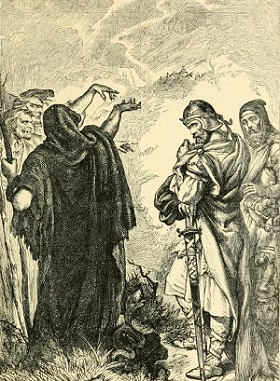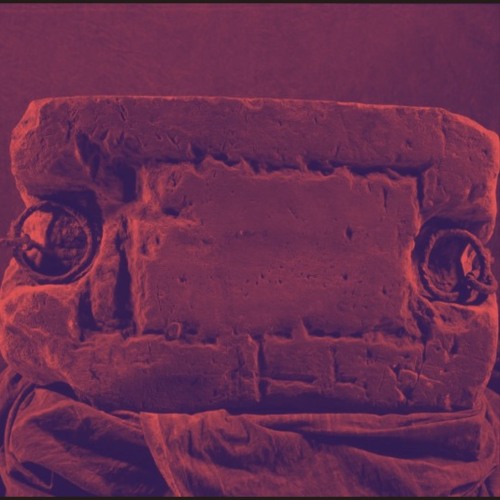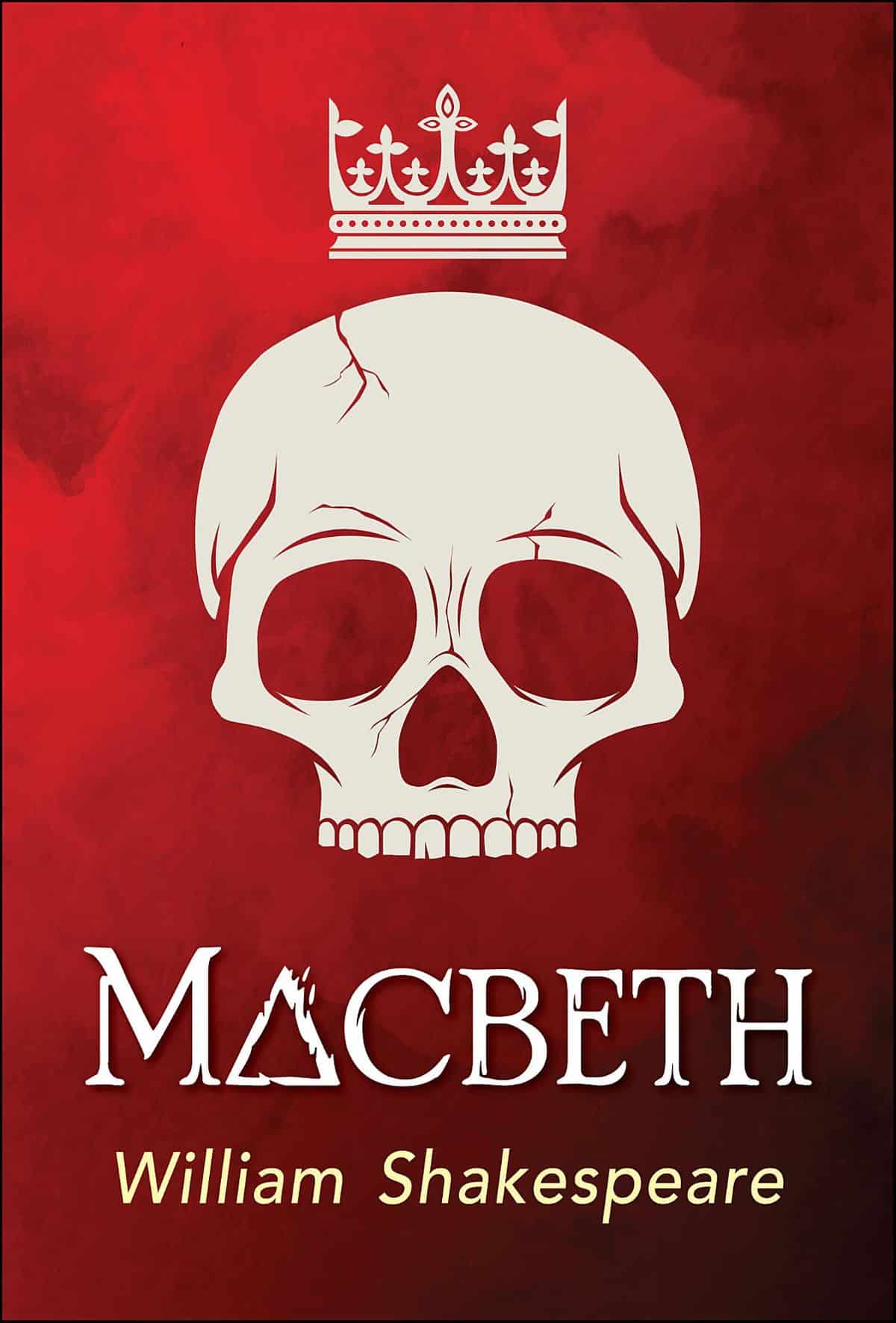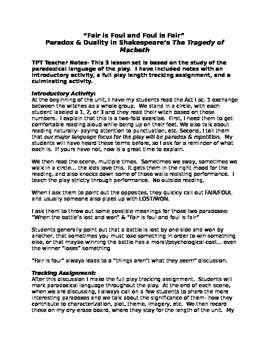The phrase "fair is foul and foul is fair," or some variation thereof, appears several times in Shakespeare's play Macbeth. It is a theme that runs throughout the play and is central to the character of Macbeth and his eventual downfall.
At the beginning of the play, the witches greet Macbeth and Banquo with the words "fair is foul and foul is fair." This phrase encapsulates the idea that appearances can be deceiving and that what is considered good or bad is often subjective and dependent on one's perspective. In the world of Macbeth, things are not always as they seem, and those who appear to be good may actually be wicked, while those who seem wicked may be secretly noble.
This theme is exemplified in the character of Macbeth himself. At the beginning of the play, Macbeth is a brave and honorable warrior who has fought bravely for his country. However, when he is tempted by the witches' prophecies and the ambitious urging of his wife, he begins to turn away from his noble nature and embrace his dark desires. He becomes consumed by his ambition and his desire for power, and he ultimately murders Duncan, the King of Scotland, to seize the throne.
Throughout the play, Macbeth grapples with his conscience as he tries to justify his actions to himself. He knows that what he has done is wrong, but he rationalizes it by saying that he has done it for the good of the kingdom. He tells himself that it is necessary for him to become king, even though he knows that he is not the rightful heir. This demonstrates how Macbeth's view of what is fair and foul has been completely inverted by his ambition and desire for power.
The theme of "fair is foul and foul is fair" is also evident in the character of Lady Macbeth. At the beginning of the play, she appears to be a devoted and loving wife, but as Macbeth's ambition grows, she becomes increasingly ruthless and manipulative. She urges Macbeth to kill Duncan and take the throne, and she actively works to cover up their crime and protect their position. In doing so, she goes against the natural order of things and betrays her own conscience, demonstrating how her view of what is fair and foul has also become distorted.
In the end, Macbeth's obsession with power and his inability to discern between what is fair and what is foul leads to his downfall. He becomes paranoid and mistrusting, and he alienates those around him who might have helped him. His rule becomes tyrannical and unstable, and he ultimately meets his demise at the hands of Macduff, a noble warrior who has remained true to his sense of justice and honor.
In conclusion, the theme of "fair is foul and foul is fair" is central to the play Macbeth and serves as a cautionary tale about the dangers of unchecked ambition and the importance of maintaining a sense of justice and honor. It demonstrates how easily one's sense of what is right and wrong can be distorted and how quickly power can corrupt.
Macbeth Act 1 Scene 1

One of those important lessons shown in this dramatic play includes the deceptive nature of appearances. Of the imperial theme. How would you interpret the line? Fair is foul and fouls is fair: Hover through the fog and filthy air. While the prophecy seems positive, it influences Macbeth's ambitious nature, and he develops into a bloodthirsty tyrant. What do the witches mean in line 12 by fair is foul and foul is fair? However, as soon as Macbeth meets the witches, everything changes. The witches are not talking about picturesque landscapes or using the word as a The scene, in its original setting, a stage with minimal scenery, seeks to separate the "real" world from the world of the witches, and part of that effort is to establish the barren, wind-blown Scottish heath, the home of the witches.
What is foul and fair in Macbeth? – Find what come to your mind

It is neither a rumination nor an observation. One type of supernova is caused by the? Simply, for witches it means whatever is fair to a common man is foul to them, and what is foul to a common man is fair to them. This is possibly the most iconic quote from the play Macbeth. Just before it exhausts all sources of energy, a massive star has an iron core surrounded by shells of silicon, sulfur, oxygen, neon, carbon, helium, and hydrogen. If you look at Duncan's first lines, at the start of scene 2 in Act I, the normal humans are operating in a world where appearances honestly and accurately represent reality.
Fair is Foul and Foul is Fair

This phrase summarizes the two characters perfectly. Examples Of Manipulation In Macbeth 1004 Words 5 Pages Macbeth Literary Essay According to some of the earliest biblical data, manipulation is one of the earliest references of natural human Impulse. Written in 1606, Macbeth, by William Shakespeare, the play dramatizes the effect of the greediness for power, strong lust after a goal, and envy, all of which are three of the seven deadly sins that many people believed in during this day age of England, in which, Macbeth takes place. Manipulation is typically seen only as negative and only benefits the originator. This gives the reader insight into what actions the witches are going to encourage from Macbeth. What are the three final options for a star when it dies? William Shakespeare, therefore, employs the use of imagery in his poem to depict darkness as evil. By giving Macbeth the title of Thane, Duncan intended to reward him for his services and continue to be loyal, while also having a higher position in the nobility.
What is the meaning of fair is foul and foul is fair? – Find what come to your mind

Macbeth, 'sleep no more: Macbeth does murder sleep, innocent sleep' 2:2:38-9 this is his punishment for his crime a living death, without peace or the ability to rest and sleep. Their parting words indicate the special character of the play right from the beginning. Before the murder of Duncan, Banquo Struggles to sleep and has reminiscence that something is wrong, this could be the affect of the evil witches on him, when he asks Fleance, 'How goes the night? His words highlight the contribution of the Witches to the events and outcomes of the play. In the event of LIFO, loading the goods into the ship is included in the freight rate, whereas unloading is not. It is everything he has ever dreamed of, the culmination of all his ambitions. Even Duncan makes reference to it in Act 1, sc. With these words, they are predicting the evil that will cloud Macbeth's judgments and that those judgments will appear to Macbeth as fair and just.






